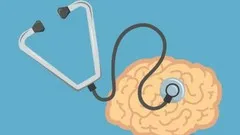
Fundamentals of Neuroscience Part 3: The Brain 
This course explores the intricate workings of the human brain, examining how its various subsystems interact to enable us to think, act, and survive in our environment. It delves into the complexities of the brain, providing an in-depth look at its structure and function. ▼
ADVERTISEMENT
Course Feature
![]() Cost:
Cost:
Free
![]() Provider:
Provider:
Edx
![]() Certificate:
Certificate:
Paid Certification
![]() Language:
Language:
English
![]() Start Date:
Start Date:
17th May, 2023
Course Overview
❗The content presented here is sourced directly from Edx platform. For comprehensive course details, including enrollment information, simply click on the 'Go to class' link on our website.
Updated in [March 06th, 2023]
This course, Fundamentals of Neuroscience Part 3: The Brain, provides an in-depth exploration of the human brain and its various subsystems. Through interactive segments, animations, and documentaries, students will gain a better understanding of how the brain works and how it enables us to survive and thrive in a changing world. The course will also cover topics such as sensation, perception, and the physiology of functional regions of the brain. Students will have the opportunity to engage with other students from around the world through discussion forums and learn from each other.
[Applications]
Upon completion of this course, students should be able to apply their knowledge of the fundamentals of neuroscience to their everyday lives. They should be able to identify the various subsystems of the brain and understand how they work together to enable us to survive and thrive. Additionally, students should be able to explain how the brain perceives the world and how it processes sensory information. Finally, they should be able to discuss the physiology of functional regions of the brain.
[Career Paths]
1. Neuroscientist: Neuroscientists study the structure and function of the nervous system, including the brain, spinal cord, and peripheral nerves. They use a variety of techniques, such as electrophysiology, imaging, and molecular biology, to investigate the development, structure, and function of the nervous system. Neuroscientists are at the forefront of research into neurological diseases and disorders, and are developing new treatments and therapies to help those affected.
2. Neuropsychologist: Neuropsychologists specialize in the study of the relationship between the brain and behavior. They use a variety of techniques, such as cognitive testing, to assess and diagnose neurological disorders. Neuropsychologists also work with patients to develop treatment plans and provide counseling and support.
3. Neurosurgeon: Neurosurgeons specialize in the diagnosis and treatment of diseases and disorders of the nervous system, including the brain, spinal cord, and peripheral nerves. They use a variety of surgical techniques, such as minimally invasive surgery, to treat neurological conditions. Neurosurgeons also work with other medical professionals to develop new treatments and therapies.
4. Neuroengineer: Neuroengineers specialize in the design and development of technologies to diagnose and treat neurological disorders. They use a variety of techniques, such as computer modeling and simulation, to develop new technologies and treatments. Neuroengineers are at the forefront of research into neurological diseases and disorders, and are developing new treatments and therapies to help those affected.
[Education Paths]
1. Neuroscience Degree: A neuroscience degree is a great way to gain a comprehensive understanding of the brain and its functions. This degree typically covers topics such as neuroanatomy, neurophysiology, neurochemistry, and cognitive neuroscience. It also provides students with the opportunity to gain hands-on experience in the laboratory, as well as the chance to explore the latest research in the field. As neuroscience continues to advance, this degree path is becoming increasingly popular and is expected to continue to grow in the coming years.
2. Cognitive Science Degree: Cognitive science is an interdisciplinary field that combines elements of psychology, neuroscience, linguistics, and computer science. This degree path provides students with a comprehensive understanding of the brain and its functions, as well as the ability to apply this knowledge to real-world problems. As technology continues to advance, cognitive science is becoming increasingly important and is expected to continue to grow in the coming years.
3. Psychology Degree: A psychology degree provides students with a comprehensive understanding of the human mind and behavior. This degree typically covers topics such as cognitive psychology, social psychology, developmental psychology, and clinical psychology. It also provides students with the opportunity to gain hands-on experience in the laboratory, as well as the chance to explore the latest research in the field. As psychology continues to advance, this degree path is becoming increasingly popular and is expected to continue to grow in the coming years.
4. Computer Science Degree: Computer science is an interdisciplinary field that combines elements of mathematics, engineering, and psychology. This degree path provides students with a comprehensive understanding of the brain and its functions, as well as the ability to apply this knowledge to real-world problems. As technology continues to advance, computer science is becoming increasingly important and is expected to continue to grow in the coming years.
Course Provider

Provider Edx's Stats at AZClass
Discussion and Reviews
0.0 (Based on 0 reviews)
Explore Similar Online Courses

Complete SEO tutorial for the Beginners

Upholstery Tips And Tricks

Python for Informatics: Exploring Information

Social Network Analysis

Introduction to Systematic Review and Meta-Analysis

The Analytics Edge

DCO042 - Python For Informatics

Causal Diagrams: Draw Your Assumptions Before Your Conclusions

Whole genome sequencing of bacterial genomes - tools and applications

Control Your Subconscious Mind: Neuroscience Hidden Secrets

Perform an Excellent Neurological Bedside Exam

Brain and Behavioral Science Fundamentals
 Related Categories
Related Categories
 Popular Providers
Popular Providers
Quiz
 Submitted Sucessfully
Submitted Sucessfully
1. What type of course is Fundamentals of Neuroscience Part 3: The Brain?
2. What type of activities are included in the course?
3. What topics are covered in the course?
4. Which of the following is NOT a feature of the Fundamentals of Neuroscience Part 3: The Brain course?
5. What is the purpose of this course?
Correct Answer: To explore the richness and complexity of the brain.


Start your review of Fundamentals of Neuroscience Part 3: The Brain